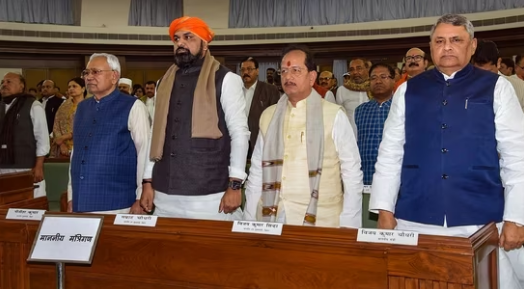CM Nitish Kumar won trust vote in Bihar Assembly
On Monday, the National Democratic Alliance (NDA) administration in Bihar ended its floor test, with 130 votes in favor of Nitish Kumar. Prior to the introduction of the resolution for a trust vote, Bihar Chief Minister Nitish Kumar claimed in an assembly speech that the RJD had engaged in corrupt activities while in power in the state and that an investigation would be launched by the newly formed NDA-led government.
During the state assembly, Kumar made a remark during the JD(U)-led motion for confidence that there had been multiple communal riots in Bihar when RJD was in power. “There was no rule of law. Prior to 2005, the RJD engaged in corrupt activities when it was in power. I’ll look into these,” he remarked.
What is Floor Test or Litmus Test or Trust Vote
● A floor test is primarily taken to know whether the executive enjoys the confidence of the legislature.
● This happens both in the Parliament and the State Legislative Assemblies.
● It is a constitutional mechanism under which a Chief Minister appointed by the Governor can be asked to prove majority on the floor of the Legislative Assembly of the state.
Composite floor test:
● While there is another test, Composite floor test, which is necessitated when more than one person stake the claim to form the government and the majority is not clear.
● Governor may call a special session to assess who has the majority. The majority is counted based on those present and voting and this can be done through voice vote also.
Constitutional Provisions
● Article 174 of the Constitution authorizes the Governor to summon, prorogue and dissolve the state legislative assembly.
● Article 174(2)(b) of the Constitution gives powers to the Governor to dissolve the Assembly on the aid and advice of the cabinet. However, the Governor can apply his mind when the advice comes from a Chief Minister whose majority could be in doubt
Article 175(2) of the Indian Constitution:
● It gives the Governor the power to summon the members of the House and call for a floor test to prove whether the incumbent government has the majority in the State Legislative Assembly (Vidhan Sabha).
● However, the Governor can exercise the above only as per Article 163 of the Constitution which says that the Governor acts on the aid and advice of the Council of Ministers headed by the Chief Minister.He can act at his discretion only when he is required to.
● According to the Apex court. the Governor does not enjoy broad discretionary powers and is always subject to constitutional standards.
● When the House is in session, it is the Speaker who can call for a floor test. But when the Assembly is not in session, the Governor’s residuary powers under Article 163 allow him to call for a floor test.
● On the central or national level, this power lies with the President.
Governor’s Discretionary Power:
● Article 163 (1) essentially limits any discretionary power of the Governor only to cases where the Constitution expressly specifies that the Governor must act on his own and apply an independent mind.
● The Governor can exercise his discretionary power under Article 174, when the chief minister has lost the support of the House and his strength is debatable.
● Generally, when doubts are cast on the chief minister that he has lost the majority, the opposition and the Governor would rally for a floor test.
● On numerous occasions, the courts have also clarified that when the majority of the ruling party is in question, a floor test must be conducted at the earliest available opportunity.
● Article 164 cl (2) of the Indian constitution: It states that, “The council of ministers shall be collectively responsible to the Legislative Assembly of the State.” And so, if they do not enjoy the Legislature’s support, the Executive has to step down.
SC’s Observations on the Governor’s Floor Test Call
● In 2016, the SC in Nabam Rebia and Bamang Felix vs Deputy Speaker case (the Arunachal Pradesh Assembly case) said that the power to summon the House is not solely vested in the Governor and should be exercised with aid and advice of the Council of Ministers and not at his own.
● A Governor cannot employ his “discretion”, and should strictly abide by the “aid and advice” of the Cabinet to summon the Assembly for a floor test.
● The Governor can summon, prorogue and dissolve the House only on the aid and advice of the Council of Ministers with the Chief Minister as the head. And not at his own.
● Article 163 of the Constitution does not give the Governor a “general discretionary power to act against or without the advice of his Council of Ministers”.
● Governor’s discretionary powers are limited to specified areas like giving assent or withholding/referring a Bill to the President or appointment of a Chief Minister or dismissal of a government which has lost of confidence but refuses to quit, etc.
● In 2020, the Supreme Court, in Shivraj Singh Chouhan & Ors versus Speaker, Madhya Pradesh Legislative Assembly & Ors, upheld the powers of the Governor to call for a floor test if there is a prima facie view that the government has lost its majority.
● The Court highlighted the facts that the Governor is not an elected authority and is a mere nominee of the President, such a nominee cannot have an overriding authority over the representatives of the people, who constitute the House or Houses of the State Legislature.
● The Governor is not denied the power to order a floor test where on the basis of the material available to the Governor it becomes evident that the issue as to whether the government commands the confidence of the House requires it to be assessed on the basis of a floor test.



